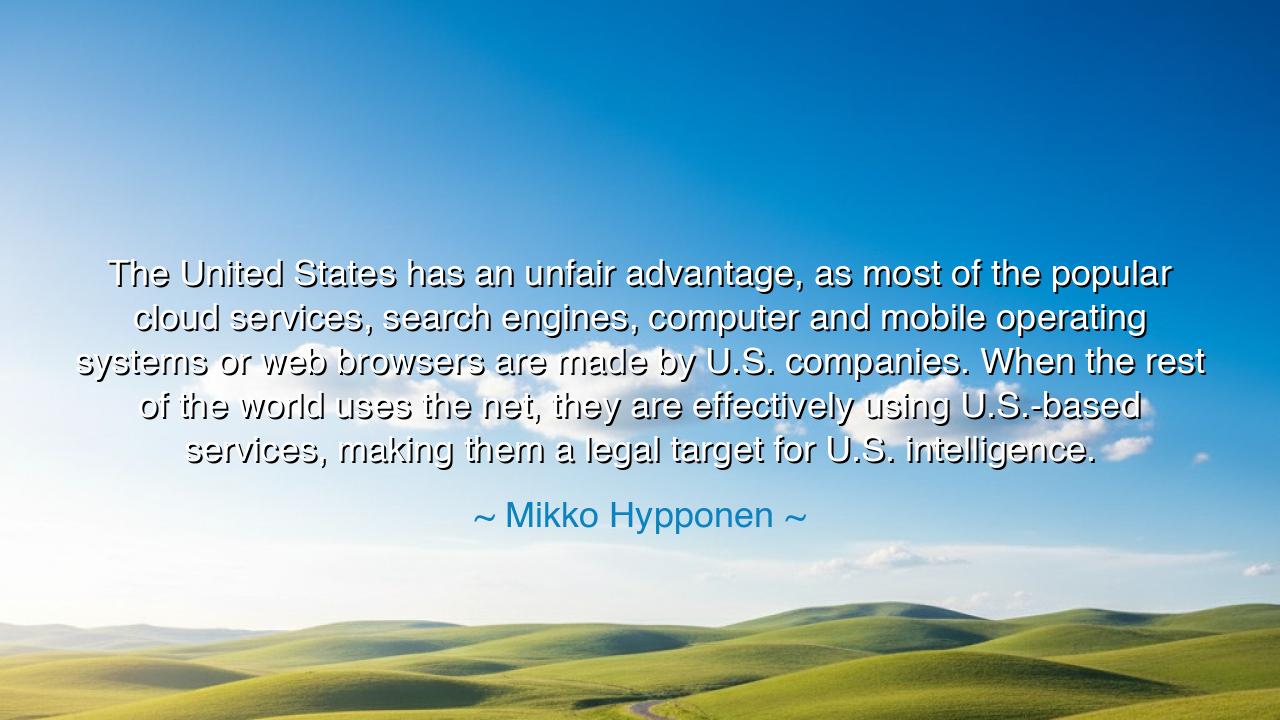
The United States has an unfair advantage, as most of the popular
The United States has an unfair advantage, as most of the popular cloud services, search engines, computer and mobile operating systems or web browsers are made by U.S. companies. When the rest of the world uses the net, they are effectively using U.S.-based services, making them a legal target for U.S. intelligence.






Hearken, children of contemplation, and attend to the words of Mikko Hypponen, a seer of the modern digital age: “The United States has an unfair advantage, as most of the popular cloud services, search engines, computer and mobile operating systems or web browsers are made by U.S. companies. When the rest of the world uses the net, they are effectively using U.S.-based services, making them a legal target for U.S. intelligence.” Pause upon these words, for they illuminate a profound truth about power, technology, and the unseen currents that govern human interaction in the modern world.
Hypponen’s insight begins with the recognition of advantage—not merely in wealth or military might, but in the dominion of information and infrastructure. The world’s reliance upon U.S.-based digital tools, from search engines to operating systems, places global citizens within a sphere of influence both technical and legal. In essence, to use these tools is to participate in a network that extends the reach of U.S. authority, making digital connectivity inseparable from oversight and control.
History offers mirrors of this principle. In the age of empires, trade routes and communication networks determined power. Venice commanded the seas and thereby influenced distant lands; the British Empire extended law and governance through colonial infrastructure. Hypponen draws a modern parallel: the United States commands the digital seas, and those who navigate them—using cloud services or search engines—enter into its jurisdiction, willingly or not. The lesson is ancient: control of infrastructure confers influence, often invisible yet deeply consequential.
Even in recent decades, the power of digital infrastructure has reshaped the nature of intelligence and oversight. Edward Snowden’s revelations showed how the interconnections of popular services could be leveraged for surveillance. Users across the globe, engaging with tools created by U.S. companies, unwittingly became nodes in a network visible to intelligence agencies. Here, Hypponen’s insight is confirmed: the net itself becomes a stage upon which legal authority and technological power converge, shaping the lives of millions without their explicit awareness.
The essence of this reflection lies in vigilance and understanding. Power in the digital age is not merely visible—it is encoded in protocols, software, and the very infrastructure that enables communication. The ancients warned that those who control the channels of knowledge and commerce wield unseen authority. Hypponen reminds us that modern citizens, like those of past empires, must navigate the instruments of influence with awareness, understanding both the opportunities and the risks embedded in their use.
Practical wisdom emerges from this reflection. Engage with technology consciously, recognizing that cloud services, search engines, and platforms are not neutral tools. Cultivate knowledge of digital rights, encryption, and personal security. Choose services and practices that align with your values and safeguard your autonomy. Awareness, education, and careful action are the shields of the modern citizen navigating the vast networks of influence.
Moreover, this lesson extends beyond the individual to societies and governance. Nations reliant on foreign infrastructure must consider the implications of dependence and vulnerability. Just as ancient kingdoms sought control over trade routes and communication, modern states must cultivate sovereignty over technology, ensuring that the flow of information and the conduct of citizens is protected from unanticipated external authority. Legal reach and technological power are inseparable, and understanding this is essential for wise governance.
Therefore, generations to come, remember Mikko Hypponen’s counsel: the tools of the digital age carry both power and responsibility. The global reliance upon U.S.-based services grants influence and legal reach far beyond borders. Engage with awareness, safeguard your information, and cultivate understanding of the networks that shape your life. In doing so, you navigate the modern world with the wisdom of the ancients, respecting the hidden currents of power while asserting your agency and protecting the sanctity of personal and collective autonomy.
If you wish, I can also craft a more poetic, mythic version of this reflection, portraying the digital networks as vast oceans of influence, where citizens must navigate carefully amidst currents of power and unseen authority, suitable for dramatic or meditative narration. Do you want me to do that?






AAdministratorAdministrator
Welcome, honored guests. Please leave a comment, we will respond soon